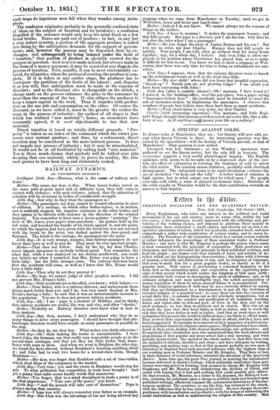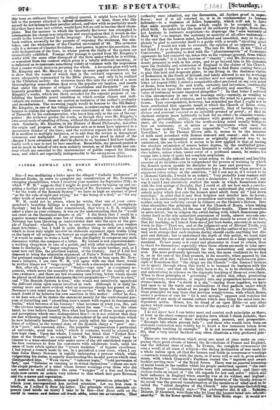Trttrro to thr itttot.
CHRISTIAN SOCIALISM AND THE QUARTERLY REVIEW.
Trin. Coll. Cambridge, 7th October 1851..
Every Englishman, who takes any interest in the political and social movements of his age and country, must be aware that, within the last two years, a few gentlemen, keenly impressed with the sufferings and pri- vations of the working classes, and disposed to attribute these mainly to competition, have subscribed a small capital, and thereby set on foot a co- operative association of tailors, which has gradually extended itself, and now comprehends a rather wide ramification of various trades, and in many lo- calities. The President of the Committee which to a certain extent controls or rather influences the proceedings of these associated trades is Professor Maurice ; and next to him Mr. Kingsley is .perhaps the person whose name is most connected with the principle of cooperation. Both gentlemen are clergymen, and have advocated the principle in their published writings, and from the pulpit ; the former with that warmth of heart and subtilty of in- tellect which are his distinguishing characteristics ; the latter with a fervour of passion, a breadth and distinctness of aim, and an eloquence of language, that seem to mark him for a great popular leader, as clearly as he is a genuine poet. Both concur in proclaiming a redeemed humanity as the basis, love as the animating spirit, and cooperation as the regulating prin- ciple of that society which would realize the kingdom of God upon earth ; and reversely both concur in denouncing the spirit of selfishness, and, as its ordinary symptom and most intelligible type, the selfish accumulation of money regardless of those by whose manual labour it is accumulated. Per- haps the religious opinions of both may be nioi.c correctly defined by saying that they are distinguished by a determination to put all the doctrines of revealed religion to a practical test ; to carry them out into the concerns of actual daily life ; to consider them not as dry scholastic propositions, but as truths revealed for the comfort and purification of all mankind, teaching duties and rights alike to rich and poor, of force in the shop and on the stock exchange, no less than on platform and in church. Men who set up to teach the poor that they have rights as well as duties, and to teach the rich that they have duties as well as rights, (and that on week-days as well as Sundays God governs the world in righteousness,) are likely to offend many. They avowed their expectation that they should so offend, and they have not been disappointed. Economists have sneered at their ignorance of political eco- nomy, and their fanatical religious extravagance; High Churchmen have shud- dered at their plain dealing with clerical shortcomings and pedantries; and Evangelicals have shrieked at men who maintained that the stock phrases and propositions of that popular and pious school had a real meaning, and were actually divine truths. The upshot of the whole matter is, that they have run the gauntlet of ridicule, invective, and abuse ; and have still gone on writing, preaching, and making way, so that at this moment probably no two men of education in England have such personal influence with the highest class of our working men as Professor Maurice and Mr. Kingsley. They have at last, in their character of social reformers, attracted the attention of the Quarterly Review. Some time ago, the great Tory journal, in noticing the introductory lectures delivered at Queen's College, which admirable institution these gen- tlemen were veryactive in forming, took occasion to charge Mr. Kingsley with blasphemy and Mr. Maurice with disbelieving the divinity of Christ, and ended with hoping that it had said nothing that could possibly give offence. On that occasion, Mr. Maurice, in a letter to his diocesan, the Bishop of Lon- don, claiming his judgment upon a charge so publicly made and founded upon published writings, effectively exposed the unconscious heterodoxy of his ano- nymous assailant. The reviewer, or one like him, has returned to the attack, with the difference that he has enlarged his field. He now charges these two gentlemen with ineendiarism and profanity—with the design of subverting the social institutions as well as undermining the religion of this country. Had this been an ordinary literary or political quarrel, it might have been fairly left to the persons attacked to defend: themselves: at least, those who like myself do not belong to their peculiar school, and'view with no partialitymuch that they have done and written, would have felt no call to become their cham- pions. But the manner in which the Quarterly Reviewer has attempted to substantiate his charge isso iniquitous and unscrupulous that it would, do dis- credit to the lowest journal in the language. For instance, Alton Locke is a bookansitten avowedly for the pur.. or exposing' the weakness, the mis- takes,. and the wickedness or the. Mardst movement of '413. The reviewer calls it a defence of Chartist Socialism ; and quotes, to prove his assertion, the wild declamations of the hero, in whose person the faults of the system are dramatically exhibited. Passage after passage is quoted from Mr. Kingsley's works with the same utter disregard of the form under which he is writing, or separated from the context which gives it a totally different meaning; or so iftlicized as toinsinuate something widely atvariance with the impression that a reader would derive in perusing the whole. A favourite plan with both Mr. Kingsley and- Mr. Maurice is to take up some popular widchword,. and to show that the wants of which that is the outward expression are far more adequately represented by the Bible phrases, and only to be realized in the Christian society: the reviewer turns this into the avowal of a- more thoroughgoing sansculottisra than even the popular cry implies, and asserts that under the phrases of religion " Jacobinism and Jacquerie " are dis- honestly preached. So again, expressions and scenes are selected from Mr. Kingsley a works, which are there recorded for the .especial purpose of ex- hibiting the horrible moral condition to which certain classes and indi- viduals are reduced : these are quoted as instances of the author's profanity and incendiarism. The crowning juggle would do honour to the OM Bailey. Mr. Kingsley, in one of his village sermons, is endeavouring to aid his-rustic hearers to realisothe opinions which were entertained of the claim of Jesus of Nazareth by his contemporaries, who knew him only as the son of the car- penter : the reviewer quotes the words, as though they were Mr. Kingsley's own usual Mode of speaking of Yeses, without the least reference to the object in view. Similarly, Mr. Maurice, in his History of Moral Philosophy, describes the origin and progress of the Christian sect as it must have appeared to a speculative thinker of the time ; and the reviewer repeats his trick of fence. It is needless to multiply instances, or to add that the review is throughout venomous and malignant I am prepared' to give proof in detail of the charges I have advanced, and shall beghalte do so, because I feel how-ineffec- tually such a case is met by bare assertion. Meanwhile, my present protest is not so much in behalf.of two men unfairly treated, as of that truth and can- dour which are essential to the maintenance of public respect for literary men, and which are especially indispensable to the anonymous critic.
GEORGE. BRIMLEY.



























 Previous page
Previous page